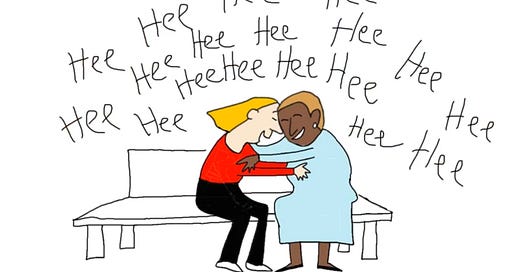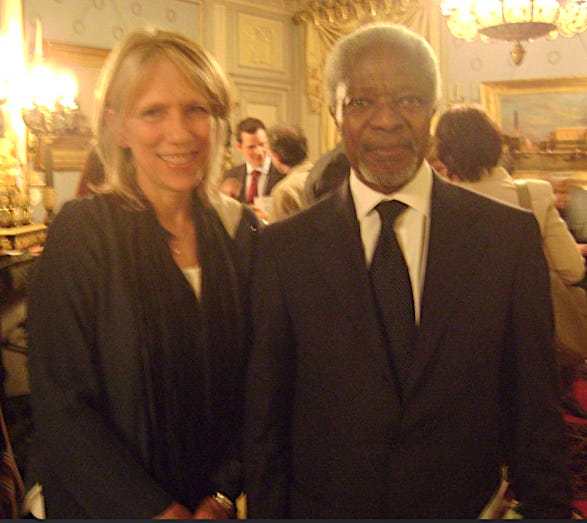Whenever there is a national story about humor, I am on it. This one is really a doozy, in a good way. Yesterday, a group of comedians were invited to meet with the Pope.
Popes meet with groups of people regularly. I know this because my mother adored the Pope. My family and I lived in Rome in 1970/71 when my father took a sabbatical, and we went to the Vatican a few times for the Pope’s regular Sunday greeting from the window high above, along with a few thousand other people. I think it was Pope Paul IV back then. But my mother signed up for a smaller gathering, and was among members of an audience of about 40 people I think. She had to sign up way in advance, but she was thrilled. I never fully understood her fixation—she was a Quaker, a religion as far removed from Catholicism as one can get—but I didn’t ask.
For decades, popes have held gatherings for poets, artists, musicians. Yesterday, Pope Francis met with 105 entertainers from 15 countries to “establish a link” between the humorists and the Roman Catholic Church.
“In the midst of so much gloomy news,” Francis told them, “you denounce abuses of power, you give voice to forgotten situations, you highlight abuses, you point out inappropriate behavior.” He also lauded them for getting people to “think critically by making them laugh and smile.”
Among the American contingent were Stephen Colbert, Jim Gaffigan, Chris Rock and Tig Notaro, the late-night hosts Conan O’Brien and Jimmy Fallon, and the comic actresses Julia Louis-Dreyfus and Whoopi Goldberg. Some of these artists have been critical of the church over the years, but it didn’t seem to be important. At the end of gathering, Francis said, “Continue to cheer people up, especially those who have the hardest time looking at life with hope,” he told them. “Help us, with a smile, to see reality with its contradictions, and to dream of a better world!”
Personally, I have a lot of problems with the church. But this was great, I have to applaud Pope Francis for acknowledging the importance of humor. I will try to forgive him for the anti-gay slurs he made twice in recent weeks, for which he apologized.
Last night I gave a talk via zoom to students at a British school in South Korea. I titled the talk “The Power of Cartoons.” Most of the work I showed them were political cartoons (my own and others), and I expressed how humor can break down barriers, foster dialogue, help us understand. Some political cartoons motivate viewers, others depress us. Some can make us feel better, as Pope Francis said. I showed this animation at the end.
Back in 2005, I was fortunate to meet Secretary General of the United Nations, Kofi Annan. He had organized a gathering of cartoonists to come speak at the UN about cartoons and humor. I was one of the twelve international cartoonists. Mr. Annan loved cartoons and understood their power. Among the things he said in his remarks that day were the following:
“I have always thought that cartoons are one of the most important elements in the press. They have a special role in forming public opinion — because an image generally has a stronger, more direct impact on the brain than a sentence does, and because many more people will look at a cartoon than read an article.
If you are flicking through a newspaper you have to make a conscious decision to stop and read an article, but it is hardly possible to stop yourself from looking at a cartoon. That means that cartoonists have a big influence on the way different groups of people look at each other.
They can encourage us to look critically at ourselves, and increase our empathy for the sufferings and frustrations of others. But they can also do the opposite. They have, in short, a big responsibility.
Cartoons make us laugh. Without them, our lives would be much sadder. But they are no laughing matter: they have the power to inform, and also to offend. Short of physical pain, few things can hurt you more directly than a caricature of yourself, of a group you belong to, or — perhaps worst — of a person you deeply respect. Cartoons, in other words, can both express and encourage intolerance, and also provoke it. And the sad truth is that they often do all three.”
That day, Annan and French cartoonist Jean Plantu founded Cartooning for Peace, and I have been a member ever since. Over the years, I got to spend more time with Mr. Annan, I am grateful. He died in 2018, and I wrote a remembrance of him, here. Annan was like the Pope for me— someone you admire, but because of the serious nature of their work, you don’t expect them to like humor. But in fact they really get it.
It’s true that among its positives, humor can be a catalyst for misunderstanding. That’s for another post, I think!
Happy Friday. See you tomorrow!







⭐⭐⭐⭐⭐
Later this year, once my cataracts have been vanquished, I may find your works less confusing. On first read, I thought the Pope was meeting a group of condoms.
This is so wonderful to read. Uplifting, indeed. Glad to see others relish your work as much as we do. Love the video. xo